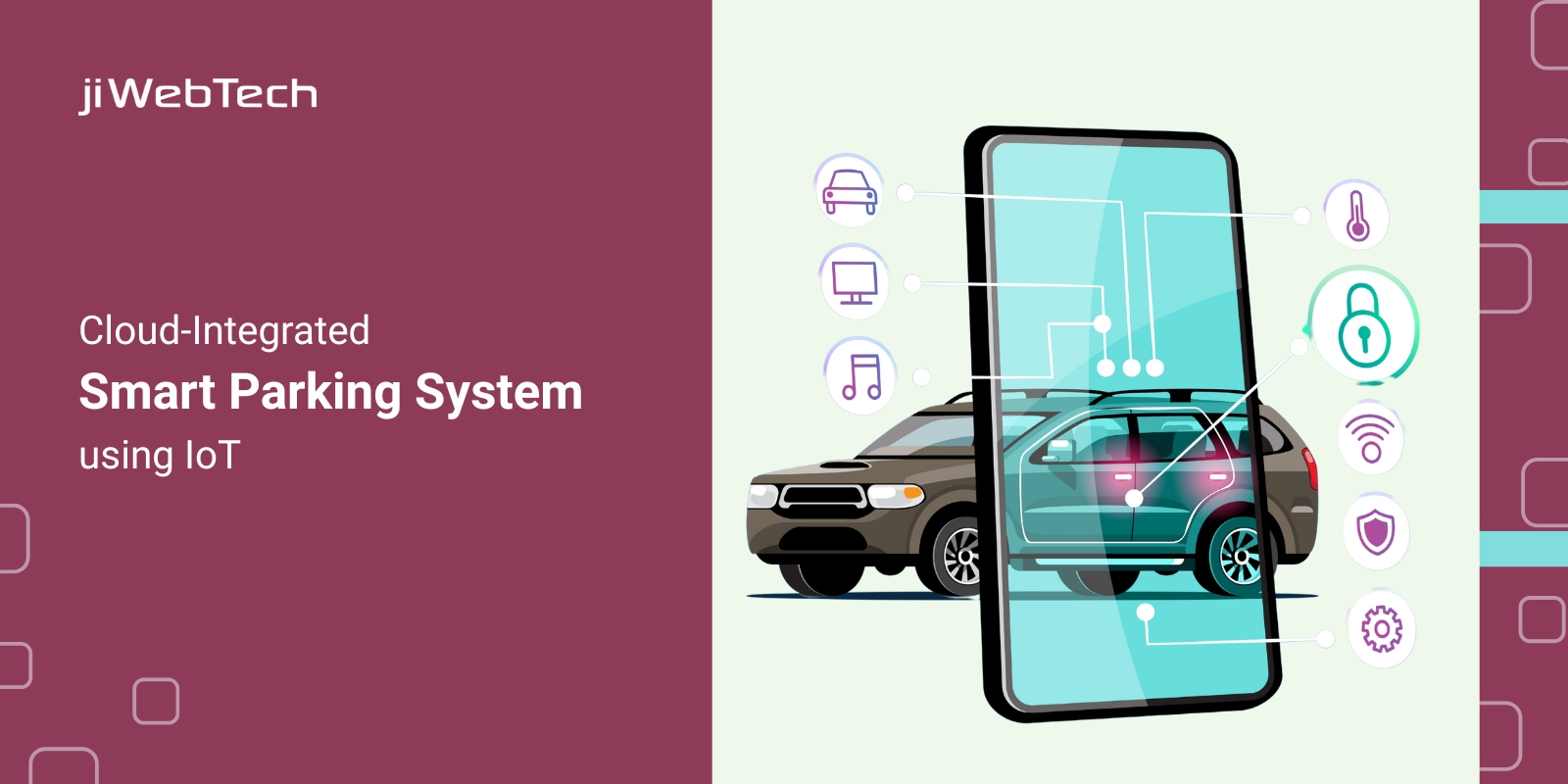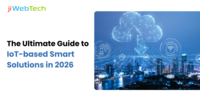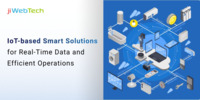- May 26, 2025
- IOT Solutions
- 2534
Share this post on:

Today, parking space shortages and traffic congestion are two major issues drivers face in cities. Due to the increase in the number of vehicles and parking spaces, heavy traffic in crowded cities is severe. Finding a safe parking space is a time-consuming process and can impact economic activities.
Did you know that in 2020, the health costs due to traffic congestion in the USA were estimated at around $13 billion? However, these stats can reach $17 billion by the end of 2030. Also, the total cost due to road congestion is estimated to reach $39 billion by the year 2031. Further, it is seen that network companies are not able to offer updated information on the parking spaces that big cars need. Hence, there is a need for a smart car parking system that can help fix parking issues and save time, cost, and fuel.
Cloud-integrated smart parking systems are a sound solution to deal with the traffic congestion issue, which in turn will help improve environmental health. These systems not only help cut down on parking time and frustration, but also reduce emissions and enhance urban mobility. Cloud-integrated smart parking systems leverage the Internet of Things (IoT), helping sensors connect physical parking space infrastructures with information and communication technology. This enhances the functionality and accessibility of the system.
Benefits of Cloud-Integrated Smart Parking System Utilizing IoT Technologies
The world has witnessed a greater level of urban mobility optimization with the rise of IoT in smart city development. Researchers are constantly innovating, and with the help of sensors and cloud platforms, they can come up with smart cloud-based parking solutions. These systems help vehicles find available parking spaces and offer convenience. In this section, we will shed light on the benefits of a cloud-integrated smart parking system:
Urban Smart Parking Management: Smart parking systems use IoT sensors that are embedded in parking spots to detect the presence of vehicles in real-time. These data points are sent to the cloud. If there is any availability, it will be updated on the apps or dashboards. This helps drive the view of real-time sport availability before arriving. This reduces the time and fuel spent searching for a place to park. Numerous cities, including San Francisco and Amsterdam, have implemented systems to address urban congestion and have seen immense improvement in traffic flow.
Data-driven Traffic Optimization: IoT Cloud-integrated smart parking systems get insights from the data gathered over time. These insights include occupancy rates, high-demand periods, and average parking durations. This data helps city planners and administrators make right decisions about traffic routing, pricing models, and infrastructure development. Integration of IoT traffic systems help cities enhance mobility and reduce bottlenecks.
Smart parking for Malls, Airports, and Campuses: Most times, there is heavy congestion in commercial environments, shopping malls, or university campuses. These smart parking system improves customer experience and operational efficiency. Also, cloud-based systems come with flexibility that helps users find, reserve, and pre-pay for a parking space through mobile apps. Cloud connectivity lets drivers get real-time updates, helping reduce queues and congestion. Also, cloud-integrated smart parking systems benefit from data logs and analytics for security and management purposes.
AI-powered Parking Prediction: AI models that run on a cloud platform help predict when parking demand will be highest based on the gathered data, weather, local events, or traffic patterns. These insights can be used to optimize staffing, adjust pricing, or send proactive notifications to drivers about the peak timing and availability in nearby lots.
Enhanced Security and Motoring: These systems use sensors that track and monitor each vehicle’s entry and exit using sensor logs or license plate recognition system that is connected to the cloud. This gathered data is used to generate reports, monitor suspicious activity, and support security personnel.
Environmental Sustainability: These systems reduce the time vehicles spend roaming here and there for parking, helping cut down greenhouse gas emissions and fuel consumption. This contributes to a clear urban environment. Also, some smart parking systems using IoT integrate with electric vehicle (EV) charging stations, guiding EVs to find charging-enabled spots.
Future Trends of Cloud-Integrated Smart Parking Systems Using IoT
Let us look at the future trends of cloud-integrated smart parking systems using IoT:
AI and Machine Learning: Artificial Intelligence and Machine Learning are helping parking systems improve a lot by enabling predictive analytics and adaptive control. These technologies easily predict parking demand and optimize space allocation, and automate notifications. Further, AI enable anomaly detection, helping improve security and maintenance scheduling.
Edge Computing: Edge computing help driver reduce reliance on round trips within parking sensors or gateways. This ensures faster response time for real-time occupancy detection. Also, it supports uninterrupted functionality even during network is not available.
Blockchain: Blockchain ensures the transparency and security in transactions, mainly for paid parking systems. This technology offer a tamper-resistant ledger to record vehicle entries, payments and reservations.
5G Communication: 5G helps smart parking work faster and better. It allows live video, many sensors, and quick app updates. 5G also makes things run smoothly in crowded cities.
Conclusion:
In conclusion, we learnt that cloud-based smart parking systems using IoT are a simple and effective way to fix parking problems in cities. They use the internet, sensors, and live data to improve traffic, save fuel, and make parking more convenient. While there are some issues like security, working together with other systems, and cost, the benefits are huge. In the future, new technologies like AI, blockchain, and 5G will make these systems even smarter and an important part of city life.
If you are searching for to hire the best Cloud-based smart parking systems provider that uses IoT to develop innovative solution, look no further than jiWeb Technologies. We are a leading provider of Cloud-based smart parking systems provider who have helped numerous businesses with our innovative solutions. Contact us to learn more.
Frequently Asked Questions:
1. What is a cloud-integrated smart parking system with IoT?
It’s a smart way to find parking spots using small sensors and the internet. The sensors tell a cloud system which spots are free, so drivers can easily find parking without wasting time.
2. How do the sensors work in smart parking?
Tiny sensors are placed in each parking spot to check if a car is there or not. They send this info to the cloud, which updates apps or signs to show where parking is available.
3. Why is using the cloud helpful for smart parking?
The cloud stores all the parking info and shares it quickly. This helps drivers find spots faster, reduces traffic jams, saves fuel, and makes parking less stressful.
4. Are there any problems with cloud-based smart parking?
Some challenges include keeping data safe, making sure different devices work well together, and the cost of setting it up. But overall, the benefits are much bigger.
5. How can drivers use these smart parking systems?
Drivers can check apps to see free parking spots, book a spot ahead of time, and pay without cash. Some places also have signs that show available spots for drivers who don’t use the app.









